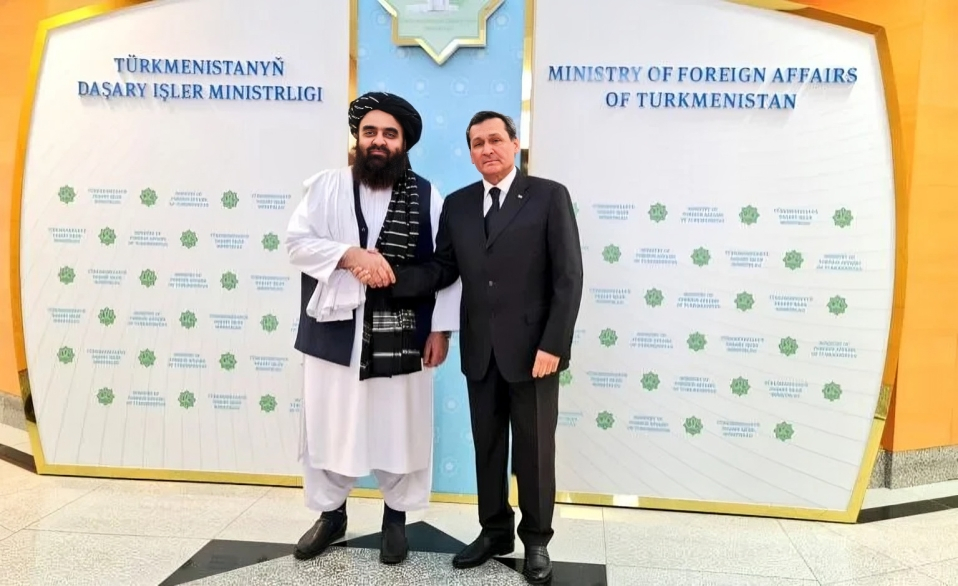Turkmenistan’s Foreign Minister Rashit Meredow and his Afghan counterpart, Amir Khan Muttaqi, have called for further promotion of joint energy and transport projects.
The visiting Afghan minister, leading a delegation consisting of representatives from various Afghan government agencies, stated that to enhance bilateral trade and goods transfers, the visa issuance process should be facilitated for Afghan businessmen and transport personnel, as reported by the website of the Islamic Emirate of Afghanistan’s Ministry of Foreign Affairs on February 26.
Referring to Afghanistan’s full-fledged preparations for the practical commencement of the Turkmenistan-Afghanistan-Pakistan-India gas pipeline (TAPI) project in Afghanistan, Muttaqi expressed hope that both countries would soon collaborate within Afghanistan.
The Afghan minister emphasized that an economic-centric policy is the main pillar of their foreign policy, focusing on regional economic connectivity. He highlighted the construction of Afghanistan’s highways and railways as priorities and encouraged Turkmenistan to invest in extending the railway line between Turghandi-Herat city and Andakhoi-Shabarghan to Mazar-e-Sharif.
It is notable that Afghanistan and Turkmenistan have two official ports, Aqina in Faryab and Torghundi in Herat province. In mid-February, Afghan and Turkmen businessmen called for increased trade at Aqina port and steps to facilitate the implementation of the new plan for Aqina.
In response, the Turkmen foreign minister stated that increasing trade with Afghanistan is a strategic priority and both teams would work to facilitate movement of people. He promised scholarships for Afghan students in fields such as electricity, railways, transport, and gas.
Calling TAPI an ambitious project with strategic importance for Turkmenistan, Meredow stated that Turkmenistan has completed enough work to start the TAPI project, and soon practical work will commence by the joint teams of both countries.
Regarding the Turkmenistan-Afghanistan-Pakistan high-voltage power transmission line, the Turkmen minister mentioned that their teams are working in Herat to increase the capacity of the Noorul Jihad substation, enabling extensive electricity production in adjacent areas to Herat city.
He also mentioned the Turkmenistan-Afghanistan railway line, stating that the plan to increase the capacity of the railway station in Turghandi has been finalized, and technical teams will soon start work.
During the talks, the two sides discussed the prospects of convening a five-lateral meeting in Ashgabat on the Lapis Lazuli corridor, which connects Afghanistan to Europe, in the near future.
Despite good economic and political relations between Turkmenistan and Afghanistan under Taliban rule in various fields, the practical work on some joint economic projects of the two countries has not resumed in Afghanistan for over two years.
In 2020, Turkmenistan and Afghanistan signed a memorandum of understanding to expedite the construction of a nearly 2,000-kilometer pipeline known as TAPI, which would transport Turkmenistan’s natural gas to Pakistan and India through Afghanistan.
The pipeline is expected to supply about 33 billion cubic meters (bcm) of gas annually from Turkmenistan’s giant Galkynysh gas field. Afghanistan will absorb five bcm, while Pakistan and India will receive 14 bcm each.
An exhibition of Afghan goods and a Turkmen-Afghan business forum are scheduled to be held in Ashgabat on March 3-5, 2024. In 2023, the total amount of exports and imports between Afghanistan and Turkmenistan reached $481 million.
According to the Ministry of Trade and Industry of Afghanistan, electricity, oil, and gas are among Turkmenistan’s key exports to Afghanistan, while Afghanistan mostly exports marble, dried fruits, potatoes, and non-alcoholic beverages to Turkmenistan.







 President Ilham Aliyev shed light on the evolving contours of the peace process with Armenia during an international conference in Baku this week. ...
President Ilham Aliyev shed light on the evolving contours of the peace process with Armenia during an international conference in Baku this week. ...
 Azerbaijan and Armenia started the process of demarcation of their border on Tuesday, with the installation of the first border markers based on ge...
Azerbaijan and Armenia started the process of demarcation of their border on Tuesday, with the installation of the first border markers based on ge...
 Armenian sappers commenced on Monday mine-clearance operations in the territories adjacent to the Saint Mary Church in village of Voskepar (Armenia...
Armenian sappers commenced on Monday mine-clearance operations in the territories adjacent to the Saint Mary Church in village of Voskepar (Armenia...
 Iran and Pakistan have signed eight cooperation documents in various fields, and agreed to strengthen ties to fight terrorism in the region.
Iran and Pakistan have signed eight cooperation documents in various fields, and agreed to strengthen ties to fight terrorism in the region.
 As the conflict between Ukraine and Russia escalates, the strategic importance of Kharkiv, Ukraine's second-largest city, has come sharply into focus.
As the conflict between Ukraine and Russia escalates, the strategic importance of Kharkiv, Ukraine's second-largest city, has come sharply into focus.
 President Aliyev emphasized the critical role of the North-South Transport Corridor in fostering transport cooperation between Azerbaijan and Russi...
President Aliyev emphasized the critical role of the North-South Transport Corridor in fostering transport cooperation between Azerbaijan and Russi...



